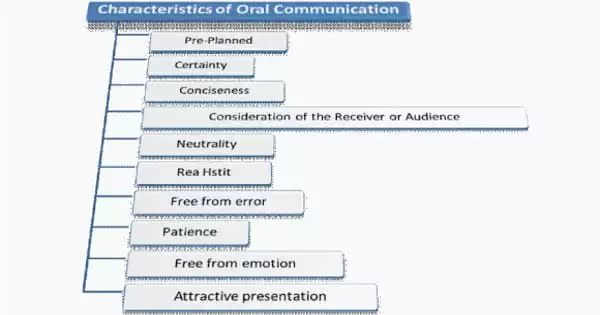Oral communication is the use of spoken words to communicate. It is the most widely used mode of communication in the world. It is a form of verbal communication in which you express your thoughts, present ideas, and share information. In other words, without this type of communication, the human is immobile. Conversations with friends, family, or colleagues are examples of oral communication, as are presentations and speeches.
However, in this context, we are discussing formal oral communication for business purposes. In this section, we will discuss some characteristics of effective oral communication. Oral communication to become successful requires some essential or good characteristics, those are highlighted as follows:
- Pre Planned
Before communicating orally, the speaker should make a thorough plan of the subject matter. Pre-planned speech can improve the effectiveness of communication. Before transmitting any message, the speaker must plan how the message will be delivered to the audience or receiver. Communication that is planned ahead of time is always fruitful.
- Certainty
When communicating with the audience, the speaker must speak clearly. In oral communication, the communicator’s speech must be clear. Language should be simple and easy to understand. To avoid confusion, the subject matter or speech in oral communication must be specific.
- Conciseness
In the case of oral communication, information should be supplemented with concrete, logical, and relevant data. Oral communication speeches should be concise and meaningful. Communication is more effective when the speech is brief but informative. The subject matter should also be simple in order to capture the audience’s attention.
- Attractive presentation
In oral communication, the message should be delivered in a pleasant tone. The sender’s message or speech should be appealing. Attractive speech is more likely to be remembered by the receiver. To keep the receiver’s attention, the speaking attitude should be catchy.
- Consideration of the Receiver or Audience
The speaker’s qualification, knowledge, experience, and motive should all be considered during oral communication. The receiver’s status, knowledge, educational qualification, and desire should all be considered in the communication. That is, the speaker must be oriented toward the receiver. The language used should be simple and easy to understand for the audience.
- Neutrality
During the speaker’s speech, the audience or receiver should remain silent. Both the sender’s and receiver’s points of view require neutrality in oral communication. The audience must analyze and evaluate the message provided before responding appropriately. Oral communications are sustained by the audience’s neutrality.
- Realistic
Unrealistic information or a message will never hold the audience’s attention. Oral communication speeches must be realistic and relevant to the subject matter. Speeches that are irrelevant or unnecessary should be avoided. As a result, a speaker should deliver a realistic speech to the audience.
- Free from error
Another requirement for effective oral communication is that the message is free of errors of any kind. Error-free speech makes communication more fruitful. If there is an error in the information in oral communication, the audience becomes confused. Furthermore, the audience will lose faith in the speaker. As a result, information in oral communication must be error-free.
- Patience
Ineffective communication requires patience to succeed. Both the speakers’ and the receivers’ points of view are required for successful oral communication. When making oral communication, both the speaker and the audience must be patient.
- Free from emotion
Emotions should be avoided in oral communication. Because emotion complicates the subject matter. As a result, the audience will misinterpret the message techniques or Way of Oral Communication.
















